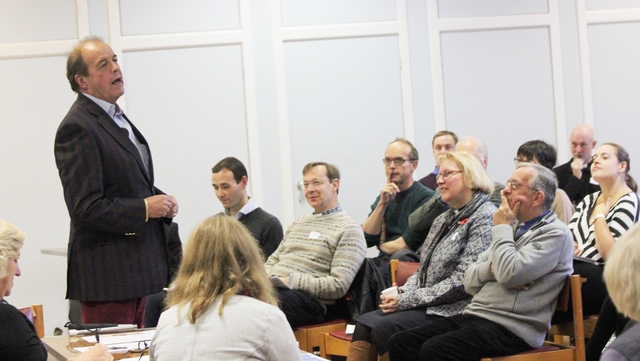
DIOCESAN SYNOD SUMMARY: November 2017
PRESIDENTIAL ADDRESS
As Bishop Christopher was on sabbatical, the presidential address was given by the Rt Rev Ian Brackley, honorary assistant bishop and former Bishop of Dorking. He drew parallels between current world events and the focus on the end-times which is part of the Church’s seasons of the Kingdom and Advent.
Read full text
GENERAL SYNOD UPDATE
General Synod member Emily Bagg updated us on the July session of the national body.It had looked at issues including clergy vestments, the creation of a clergy covenant, welcoming transgender people and the cost of citizenship. Details of the July session of General Synod can be found on the Church of England website.
DIOCESAN SYNOD ELECTIONS 2018
Members heard about arrangements for the 2018 elections to Diocesan Synod. There will be 60 places for elected clergy members and 60 for elected lay people.. The allocation of places across our seven deaneries has changed only slightly since the previous elections in 2015. Members discussed the style of voting that should be used in the election, and decided to retain the normal first-past-the-post system.
BUDGET 2018
Director of finance Malcolm Twigger-Ross presented a paper summarising the main challenges and pressures on the diocese’s 2018 budget, which can be read in full here. The main finding is that Bishop’s Council is proposing a two per cent increase in total parish share to be collected, lower than the three per cent rise which was originally forecast.
Among the main budget pressures are a two per cent increase in clergy stipends, the imposition of the government’s apprenticeship levy, an increase of four per cent in the amount given to the national Church, a reduction in rental incomes from our parsonages, and our desire to make strategic investments in mission and ministry. Those investments include new pioneer ministry, the new Harbour Church, increasing the number of curates and vocations and our continued investment in parsonages.
The consultation with parishes had highlighted concerns about sustainability: could we keep up these priorities when regular church attendance was declining? The figures showed that total PCC income across the diocese had risen in 2015, but that the number of planned givers had reduced. The other national concern was that the Church has not trained enough clergy to replace those who are about to retire – we expect a 20 per cent reduction in the total number of clergy by 2024.
This would be the third of three years in which we had already committed to keeping total parish share increases at or below inflation. Next year, there will be a full consultation process on the shape of the diocesan budget for 2019-21. This will include looking at how to resource our live, pray, serve strategy, issues of sustainability, engagement with lower numbers of clergy, and a strategy to address our buildings.
Questions from synod members examined the difference between the financial commitment of older worshippers to the Church and both younger and less committed worshippers; a desire to address the issue of declining clergy numbers sooner; and a query regarding our assumptions regarding clergy vacancy numbers. Synod members passed the motion, calling for £5,004,370 to be raised in parish share in 2018.
LIVE PRAY SERVE STRATEGY
Synod members spent two hours examining and discussing the detail of our diocesan strategy – live, pray, serve.
Archdeacon Joanne Grenfell gave an overview of how the strategy was created, what it is, and the next steps forward. The challenge now is for us to develop this vision for ministry and mission in all our parishes and deaneries. Each will be asked formally for its plan for growth. That will also involve working out what central support each parish and deanery will need for these things to happen. It will also involve some kind of evaluation process – how will we know that we are on the right track, and what do we do if we’re not?
Four members then gave concrete examples of projects and initiatives that illustrated each of the four elements of live, pray, serve:
- Transforming Society: the Rev Mike Pye talked about the project to promote cooking among older men at All Saints Church, Portsmouth, which was helping them with key skills and social opportunities. Read more here
- Growing Churches: the Ven Peter Sutton talked about plans to create a team ministry to encourage co-operation between the six parishes in the Bay. This was already starting to expand congregations in the four parishes which currently have a priest. Read more here
- Making Disciples: the Rev Max Cross talked about a rural initiative in deepening discipleship being led by Rev Rhona Stuart-Bourne. This centres around the study of the set scripture for the Sunday service in the context of a weekday prayer service. The chance to discuss the scripture together is helping people to engage with the bible and to get more out of the Sunday sermon.
- Learning for Life: the Rev Paul Gully spoke about an initiative run in his parish by Julie Minter a Pathway ordinand. Sessions using craft and other visual, tactile and aural ways to engage with spirituality.